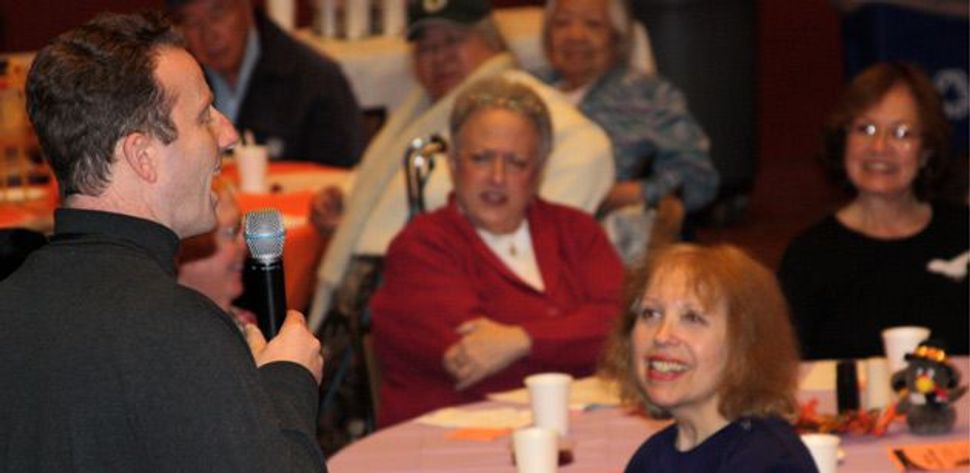Major Jewish Foundation Turns to the Fold for New CEO

Barry Finestone speaking at the JCC in San Francisco, his first job back in the Jewish world after a hiatus in retail. Image by JCC of San Francisco
A major Jewish foundation recently named a veteran Jewish professional – instead of a businessman or white-shoe lawyer – its first president and CEO on Feb. 17.
Barry Finestone, who started his climb up the ranks as a camp director in the 1990s, will succeed Chip Edelsberg, the Jim Joseph foundation’s first executive director, on Jan. 1, 2017.
Currently the executive director of the Lisa and John Pritzker Family Fund, Finestone, 49, is a Scottish native who has also led the JCC of San Francisco, the second-largest in the country, and the Isaac M. Wise Temple in Cincinnati.
His ascension to the top job at one of the biggest Jewish foundations signals a new desire among Jewish organizations to look inward for leaders.
“This is applauding the Jewish communal field and recognizing the strengths of people working in philanthropy and community work,” said Steven Windmueller, an emeritus professor of communal service at Hebrew Union College.
Indeed, Finestone’s resume matches Edelsberg’s in important ways, Windmueller said. They both have degrees in education and went on to accumulate broad experience in different kinds of organizations, including foundations and synagogues.
“Maybe they were looking for a second Chip,” Windmueller said.

Image by Sasha Gulish
Finestone and Edelsberg declined to comment.
Based in San Francisco, the Jim Joseph Foundation’s focus is the Jewish education of children, teens and young adults. It’s given out $400 million in grants since its founding in 2006 and is one of the three biggest Jewish foundations by grants, along with the Avi Chai and Schusterman foundations, said Dan Brown, editor of the website eJewishPhilanthropy.
Finestone may have begun his communal career among the bathing suit-strewn bunks of a Young Judaea camp, but even he spent about five years working outside the Jewish world, helping to run retail businesses in Cincinnati – a chain of florists, and a candy bouquet company. More recently, some very high-profile Jewish hirings have plucked leaders from other fields.
Just last summer, campus group Hillel International proudly announced that it had hired Mimi Kravetz to become its first chief talent officer, someone whose entire job would consist of attracting and keeping top talent. The move itself underlined the need for more people like her: Hillel had to poach Kravetz from no less a marquee name than tech giant Google.
And about two years ago, the Anti-Defamation League named Jonathan Greenblatt, an entrepreneur and political appointee, the successor to longstanding chief Abraham Foxman. Eric Goldstein, a partner at law firm Paul, Weiss, Rifkind, Wharton & Garrison, became the CEO of New York’s federation around that time as well.
The board members whose wealth enables them to support and guide its communal institutions often themselves built successful careers in the for-profit sector, which can predispose them to look for leaders there, Windmueller said.
“There was a perception that there was no model of success within the Jewish world,” Windmueller said.
Amid hires like Goldstein’s, the community’s big donors – including the Jim Joseph Foundation – realized that perception had become a self-fulfilling prophecy, and resolved to do something about it. First they hired an outside organization, the Bridgespan Group, to study the problem. Then they formed their own organization, Leading Edge, to figure out what to do about it.
That group’s first effort is a “CEO Onboarding” project that provides new leaders with consultants, mentors and leadership development, said Gali Cooks, its executive director. More than 15 Jewish foundations and nonprofits fund the alliance, including Crown Family Philanthropies, the Harry and Jeanette Weinberg Foundation and the Jewish Federation of Greater Washington, in addition to the Jim Joseph Foundation.
Cooks maintains that of the roughly 100,000 Jewish professionals in North America, there’s tons of talent, but that the Jewish world hasn’t done a great job of developing it. After all, Finestone himself was almost lost to the business world in 2005.
When in 2010 he returned, to run the JCC in San Francisco, he told the Forward that he’d thought he’d left the “old country” for good. “When I went out of Jewish work I didn’t think I would get back in. I was enjoying being out. I was very focused on it.”
Today, the data show that many of Finestone’s peers didn’t make the same choice. The Bridgespan Group’s report revealed that 75% to 90% of Jewish nonprofit organizations would need to find new executive directors in the next five to seven years.
But Finestone’s hiring is “a testament to the fact that you don’t have to go out of he sector to climb the ladder,” said Cooks. “We know there’s talent and we just have to do a better job of helping the best talent find the best opportunities in our ecosystem.”
















